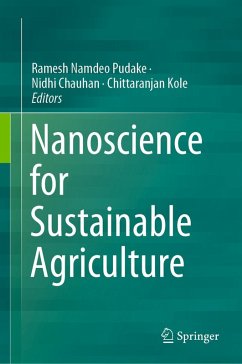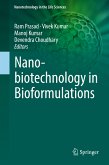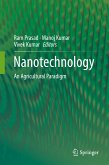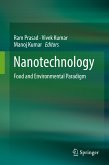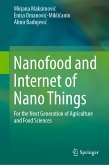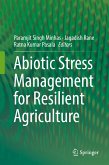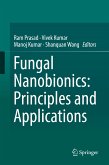Dr. Ramesh N. Pudake is an Assistant Professor at Amity University Uttar Pradesh, India - one of the top-ranked private universities in India. Since obtaining his PhD in Crop Genetics and Breeding from China Agricultural University, Beijing, PRC, he has pursued research on a range of organisms, but with a focus on crop plant genomics. He has also worked at the Department of Agronomy at Iowa State University Ames, IA, USA on host-pathogen interaction and gene mapping. Currently, he is focusing on research and teaching in the field of nanotechnology applications in agriculture. Dr. Pudake has published more than 25 research papers and 8 book chapters, and received one scholarship award from the Chinese Government. He is also an expert reviewer for several respected journals of repute. Dr. Chauhan is an Assistant Professor at Amity University Uttar Pradesh, India and has more than nine years research experience in the field of bio-molecules, nanomaterials, electrochemistry and biosensor technology. Her research on detection of diseases and biologically important molecules is of high scientific and social relevance. Her work has focused on "Synthesis of nanosensing interfaces for the detection of various metabolites in clinical samples". She has made an outstanding contribution to developing novel biosensors for fine detection and measurement of metabolites in human body fluids, essential for reliable diagnosis and better management of human health and diseases. She has constructed laboratory models of amperometric biosensors for determination of pesticides, uric acid, cholesterol, oxalate, xanthine, creatinine, bilirubin, hydrogen peroxide, glutathione, lysine, tyrosine and ascorbic acid (major contribution). She has also prepared biosensors for measurement of polyphenol, triglyceride and acetylcholine. Dr. Chauhan's contribution to the field of nanobiotechnology is evident in her 65 research papers, 5 reviews, and 1 book. In addition to her published work, Dr. Chauhan has received several awards, including PhD Gold Medal, Shakuntala Amir Chand Award from the ICMR, Indo-Australian Career Boosting Gold Fellowship from the DBT and an award for outstanding contribution in advanced research from the International Association of Advanced Materials - Young Scientist Award. Prof. Chittaranjan Kole is an internationally reputed scientist with an illustrious professional career spanning over thirty-four years and original contributions in the fields of plant genomics, biotechnology and molecular breeding leading to the publication of more than 160 quality research articles and reviews. He has edited over 100 books for the leading publishers of the world including Springer, Wiley-Blackwell and Taylor and Francis Group. His scientific contributions and editing acumen have been appreciated by seven Nobel Laureates including Profs. Norman Borlaug, Arthur Kornberg, Werner Arber, Phillip Sharp, Günter Blobel, Lee Hartwell and Roger Kornberg. He has been honored with a number of Fellowships, Honorary Fellowships, and national and international awards including the Outstanding Crop Scientist award conferred by the International Crop Science Society, and Honorary Fellowship and Distinguished Professorship conferred by the Henan Academy of Agricultural Sciences, China. He has served at all prestigious positions in academia including as Vice-Chancellor BC Agricultural university, Project Coordinator of Indo-Russian Center of Biotechnology in India, and Director of Research of Institute of Nutraceutical Research of Clemson University, in USA. He worked also in the Pennsylvania State University and Clemson University as Visiting Professor in USA. Prof. Kole is now working at the ICAR-National Research Center on Plant Biotechnology, New Delhi with the Raja Ramanna Fellowship awarded by the Department of Atomic Energy, Government of India. He is also heading the International Climate-Resilient Crop Genomics Consortium and International consortium for Phytomedomics and Nutriomics as their founding Principal Coordinator.
Application of Nanotechnology in genetic improvement in crops.- Nano-biofertilizers in crop nutrition: An overview.- Micronutrient management in field crops through nanotools.- Nanomaterials in rhizospheric soil: An insight on soil-plant interface behaviour.- Biopolymeric nanoparticles as a nanocide for crop protection.- Use of Carbon nanomaterials in plant growth and protection.- Nanotechnology and entomopathogenic microorganism in modern agriculture.- Nanosensors for plant disease diagnosis: Current understanding and future perspectives.- Plant pathogen control by nanocides.- Role of nanomaterials in nematode control.- Progress on nanoparticles as carriers for pesticides delivery to sustainable growth of agriculture.- Nanotools for weed control.- Nanotools for irrigation water remediation.- Nanotechnology applications in food: A scientometric overview.- Applications of nanotechnology in functional food.- Nanomaterials for active and smart packaging.- Nanotechnology for enhancing sea food production and its application in coastal agriculture.- Sensors for food quality monitoring.- Role of nanoliposomes in the food sector.- Drug encapsulation and nanocarriers for targeted delivery in animals.- Nano-materials in dairy industry: Current and future prospects.- Nanoparticles for detection, imaging and diagnostics applications in animals.- Nanotechnology for aquaculture.- Biosynthesis of nanoparticles by forest plant species and its uses in plant protection.- Nanocellulose from agro-residues and forest biomass for pulp and paper product.- Application of nanotechnology for value addition in medicinal and aromatic plants.- Nano-enabled technological interventions for sustainable production, protection and storage of horticultural crops.- Nano-materials and vegetable crops: Realizing the concept of sustainable production.- Structural and ultrastructural changes in nanoparticles exposed plants.- Nano-robotics and sustainability in agriculture.- Microfluidics devices for Agricultural application.

